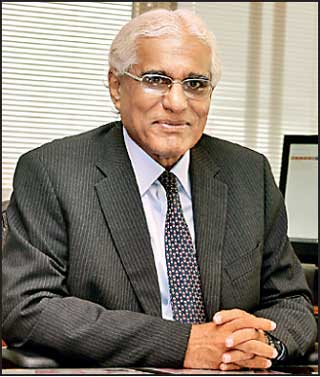Thursday Feb 19, 2026
Thursday Feb 19, 2026
Thursday, 20 June 2024 00:30 - - {{hitsCtrl.values.hits}}
 |
| Dr. Indrajit Coomaraswamy |
Top economist Dr. Indrajit Coomaraswamy yesterday cautioned that social and political stability can be at stake if there are reversals in on-going frameworks for macroeconomic policy-making and structural reforms.
“The premium attached to getting it right this time is very high indeed given the sharp increase in income poverty and multidimensional vulnerability. Social and political stability can be at stake,” said Dr. Coomaraswamy, a former Governor of the Central Bank of Sri Lanka.
He made this observation in comments to the Daily FT about his optimism about the economic prospects of the country.
“It is true that there has been impressive stabilisation of the economy from where we were two years ago. Sri Lanka is over performing on the IMF targets on several key macroeconomic indicators, e.g. growth, inflation, Government revenue and the primary balance, the current account of the bop, external reserves, etc. However, it is very important to remember that we have been here before in a number of previous IMF programs when stabilisation targets were achieved,” pointed out Dr. Coomaraswamy.
He emphasised two points. One is on the previous occasions, the good work on stabilising the economy was undone by fiscal indiscipline, often supported by loose monetary policy, during elections. “Clearly, the same mistakes need to be avoided this time around,” he stressed.
The second point according to him is that previously there has also invariably been a very poor record of implementing the structural reforms required to deliver sustained growth and higher value employment, primarily through constructing a competitive and outward looking economy that delivers export transformation.
“There is no need to reinvent the wheel. Several countries in Asia have achieved this, though it must be conceded the overall external environment is more challenging now. As against this, India is a bigger opportunity than ever before,” Dr. Coomaraswamy said. He noted that the Economic Transformation Bill seeks to reverse many of the past failures by pushing through structural reforms across a range of policy issues.
What is different this time, according to Dr. Coomaraswamy, is that clear frameworks have been set out for macroeconomic policy-formulation and they are being embedded in laws. Equally, an attempt is being made to embed in law several of the long overdue structural reforms contained in the Economic Transformation Bill. Having clear frameworks for macroeconomic policy-making and structural reforms with ongoing efforts to embed them in laws is a major advance, he added.
“It is still too early to tell whether the demoralising legacy of non-implementation or even outright policy reversal has been overcome as it is still not clear there is consensus on continuity.
This time around, post-Aragalaya, there is likely to be far less patience with inconsistent and unpredictable policies, particularly those which have clearly failed in 1970-77 and 2020-22,” recalled Dr. Coomaraswamy.